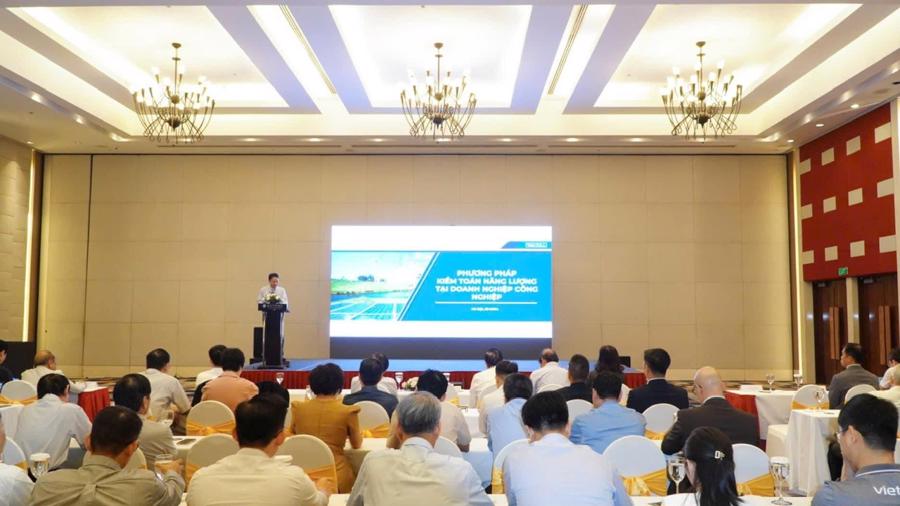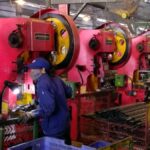## Energy Efficiency Solutions in Vietnam: Unlocking Industrial Sector’s Potential
According to statistics presented by the Ministry of Industry and Trade at the seminar “Energy Efficiency Solutions in Industry” on September 24, over 90% of household appliances now have energy labels, following the mandatory energy labeling program that began on July 1, 2013.
Significant Energy Saving Potential Remains Untapped
The program successfully phased out incandescent light bulbs and improved energy efficiency for six energy-intensive products: transformers, air conditioners, rice cookers, electric fans, fluorescent tube lights, and CFLs.
In the context of Vietnam’s construction industry, with an annual floor space growth rate of over 40%, the potential for energy savings in buildings is estimated at 30-35%.
These figures highlight the substantial energy-saving opportunities in various sectors. Vietnam Electricity (EVN) calculations show that there are 3,068 energy-intensive facilities in the country, consuming at least 1,000 TOE (equivalent to 6 million kWh of electricity) annually.
These businesses have an average electricity consumption of 80 billion kWh per year. If they achieve a minimal 2% reduction in electricity consumption annually, as per the Prime Minister’s Directive No. 20/CT-TTg on enhancing energy conservation in the 2023–2025 period, the country could save approximately 1.6 billion kWh of electricity, resulting in cost savings of over VND 3,200 billion.
Moreover, efficient energy use offers substantial benefits for both industry and the environment. For instance, with Toshiba’s new-generation electric motor solution, businesses can reduce operating costs by optimizing motor efficiency, significantly lowering electricity consumption and enhancing their market competitiveness.
Using energy-efficient products also reduces electricity consumption and CO2 emissions, positively contributing to sustainable development goals and corporate social responsibility.
Additionally, stable and durable motor operations minimize maintenance downtime and production disruptions, enabling businesses to maximize their production efficiency.
The Need for Energy Consulting and Audit Firms
As stated by a representative of Vietnam Technology Solutions JSC (VETS), the industrial sector in Vietnam has the highest energy consumption, accounting for over 50% of the country’s total energy use and continuously increasing. The greenhouse gas emissions from these industries are also correspondingly high. Therefore, it is crucial to provide support to industrial enterprises to enhance their energy efficiency.

Energy audits are mandatory for energy-intensive facilities and serve as the initial step toward energy conservation and efficiency. They help accurately assess the current state of energy consumption systems, identify energy wastage, and propose improvement solutions for businesses.
While thousands of energy audit projects have been implemented across various sectors, the monitoring and supervision of these activities remain limited.
Although the Ministry of Industry and Trade has issued guidance on “Steps to Conduct Energy Audits and Energy Audit Report Templates” through Circular No. 25/TT-BCT dated September 29, 2020, there are still certain challenges and obstacles in its implementation.
VETS experts attribute this to businesses’ limited understanding of the benefits of energy audits, resulting in underutilization of the potential advantages of conducting such audits.
Additionally, limited knowledge about energy-consuming equipment and systems, along with a primary focus on production efficiency rather than energy conservation, hinders progress. Furthermore, the high investment costs associated with energy efficiency improvement projects pose a significant challenge for businesses.
Regarding energy-saving potential, VETS energy audit specialists believe that while the policy framework is improving, there is room for further progress. However, it is essential to engage experienced consulting firms that adhere to the energy audit procedures and guidelines provided by the Ministry of Industry and Trade.
These consulting firms should provide detailed analyses of energy-saving solutions, including technical approaches, cost savings, and payback periods.
For industrial enterprises, VETS experts recommend regular energy audit reports and strong leadership commitment. In the current challenging economic climate, implementing energy-saving measures can be a strategic decision to reduce production costs and enhance competitiveness.
When considering proposed energy-saving solutions, businesses should not only focus on the technical and economic aspects but also recognize the environmental benefits and non-energy advantages. For solutions requiring high capital investments, government and international organization support is recommended to reduce energy consumption and emissions.
On September 25, the Ministry of Industry and Trade, in collaboration with the Vietnam Energy Conservation and Energy Efficiency Association (VECEA), launched the “Energy Efficiency Awards in Industry and Construction 2024” and the “Most Energy-Efficient Product Award 2024.”
These annual awards aim to recognize and honor outstanding industrial enterprises and construction projects that have successfully implemented energy-efficient solutions. They also encourage businesses to adopt advanced management practices and technologies to develop superior products with improved technical performance, energy efficiency, and reduced energy consumption.
The awards are expected to contribute to the National Program on Energy Efficiency’s goal of achieving an 8-10% energy savings target during the 2019–2030 period.
The submission period for the awards commences on September 25, 2024, and concludes on November 30, 2024, with the winners expected to be announced in December 2024.
















